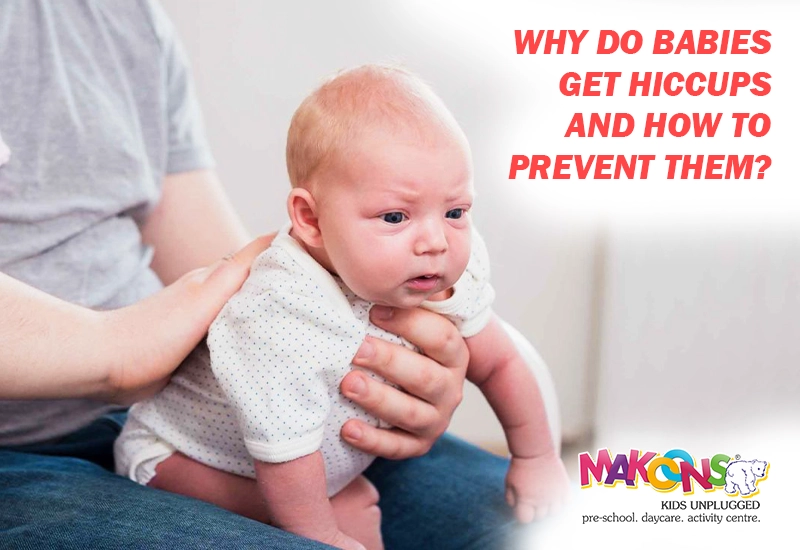Every parent is aware of the moment when their baby starts hiccupping during a meal or sleep. Though these rhythmic sounds would seem odd, they are markers of typical development. Above all, small mistakes usually cause no suffering. This blog guides you about the causes and methods to stop hiccups.
What Are Baby Hiccups?
Exactly what they sound like, baby hiccups are those little “hic” sounds emanating from your baby’s chest. They occur when the muscle used for breathing, the diaphragm, contracts or tightens up unexpectedly. The vocal cord snaps shut from this rapid movement, producing the recognizable hiccup sound we all know.
Although adults may find hiccups uncomfortable, they typically hardly bother any infants at all. Many babies pass right through their hiccups, sleeping, eating, or playing without any discomfort.
Understanding Baby Hiccups Causes
Your child may have hiccups for several different reasons. Understanding these baby mishaps will help you to better look after your child and spot when hiccups are normal.
Immature Nervous System
Developing nervous systems of newborns are still learn how to regulate various body processes. Nerves that might not be perfectly coordinated yet control the diaphragm. This causes hiccups since the muscle can contract suddenly. Usually, hiccups become less common as your child develops and their nervous system matures.
Feeding-Related Causes
One of the most common baby hiccups has to do with feeding. Hiccups usually follow from babies eating too quickly, swallowing too much air, or drinking more milk than their small stomachs can comfortably handle. This occurs as a full stomach can press against the diaphragm, causing those involuntary contractions.
Though bottle-fed babies might be somewhat more likely to have feeding-related hiccups because of the way they suck from bottles, both breastfed and bottle-fed babies can have them.
Temperature Changes
Sudden temperature changes can also cause hiccups in babies. This could occur when you transfer your infant from a warm to a cooler room or when they sip something at a temperature different from their comfort level.
Gastroesophageal Reflux
In some infants, a mild form of reflux may occur, causing stomach contents to gently rise . This can throw off the diaphragm and create hiccups. You should talk to your pediatrician if your infant seems uncomfortable during or after a meal or if frequent spitting up accompanies hiccups.
How to Stop Baby Hiccups Gentle Methods?
There are several gentle techniques you could try if you find your baby has hiccups. These newborn hiccup fixes are generally safe and quite successful.
Change Feeding Position
Try moving your infant if hiccups begin during feeding. Try holding them more upright, or experiment with a different feeding position. This can help to naturally stop the hiccups and help to lessen the air they swallow.
Burp Your Baby
Your baby may have trapped air, causing the hiccups, released by gently burping them. Holding them upright against your shoulder or sitting them on your lap with support, gently pat or rub their back.
Offer Small Sips
If your infant is old enough and you are bottle-feeding, sometimes offering little sips of milk or water will help. Swallowing may aid in re-establishing the diaphragm’s rhythm. This should only be done, though, as advised by your doctor or with infants already consuming solid foods.
Try Pacifier Comfort
sucking on a pacifier can help some newborns stop hiccups. The diaphragm can be relaxed and normal breathing patterns restored by the rhythmic sucking action.
Wait It Out
Often, the best course of action is just to wait. Most little mishaps go away on their own in a few minutes to an hour. Often, the best cure is patience since hiccups hardly trouble babies as much as they do adults.
How to Prevent Hiccups in Infants?
When it comes to baby hiccups, prevention usually comes easier than treatment. These techniques help to avoid problems for newborns:
Feed More Slowly
Take breaks during meals to help you eat more slowly. Try changing sides if you are nursing and your baby seems to be drinking rather rapidly. To slow down milk flow in bottle-feeding, pick nipples with smaller holes.
Keep Baby Upright
Hold your baby upright during and after feeding. This lowers diaphragm pressure and helps avoid air from becoming caught in the stomach.
Burp Regularly
Make burping a regular component of meals. Try burping your baby midway through and once more at the end. This releases air before it can start to trouble you.
Avoid Overfeeding
Watch your baby for signs of hunger; try not to overfeed. A too-full stomach strains the diaphragm, which increases hiccups’ likelihood.
Maintain Comfortable Temperatures
Try to keep the surroundings of your baby at a consistent, comfortable temperature. When at all possible, avoid abrupt temperature swings.
When to See a Doctor?
Though most of the time, hiccups are benign, occasionally you should see your pediatrician:
- If hiccups persist for more than a few hours regularly
- Should your infant seem unhappy or uncomfortable during hiccups
- Should hiccups affect regular sleeping or eating?
- If hiccups also cause coughing, too much spitting up, or trouble breathing,
- Should you observe any other worrisome symptoms in addition to regular hiccups?
Also Read – Why Does My Baby Spit Up Curdled Milk? Understanding Infant Digestion?
Final Thoughts
Normal aspects of newborn development include occasional hiccups. Knowing the causes of the baby’s hiccups and how to stop them will help you feel more confident as a parent. Remember that these newborn hiccup remedies are only gentle recommendations; the most crucial thing is to remain calm and patient.
As their nervous systems develop and their feeding techniques get better, most babies outgrow frequent hiccups. While this is going on, concentrate on preventing hiccups in newborns during feeding times and avoid stressing too much should hiccups arise.
Usually, your baby’s hiccups are simply another indication that their small body is developing normally. Love, patience, and time will help you and your child negotiate this period.


